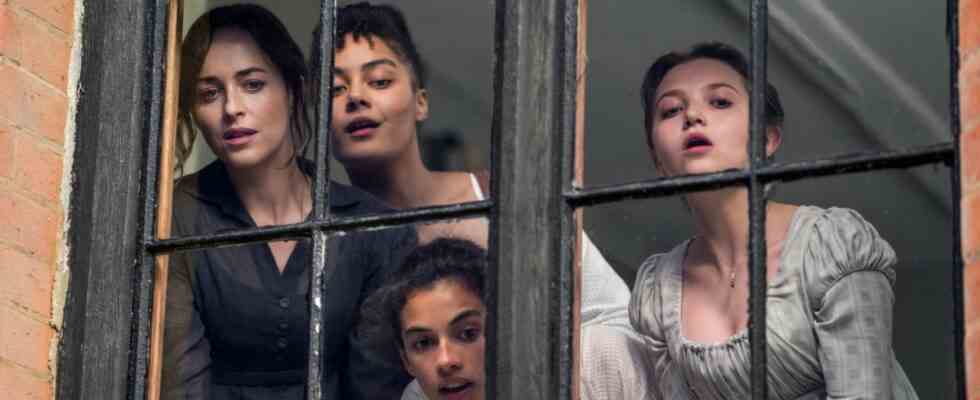It’s rare for a film to trigger such a storm of indignation: “Not just the worst Austen film adaptation, but one of the worst films in recent history”, “disappointingly limp”, “more wrong notes than a drunken harp ensemble” , “disastrously misguided”, “a travesty”. On Twitter, of course, the words are even harsher – “those responsible should go to jail” is the most harmless thing.
What could be so bad about a film that adapts a well-loved classic? Now the Jane Austen fan community is freaking out like usual disappointed ones “Star Wars” fans? Are literary conservatives at work here who can’t stand it when a classic is modernized?
It is the modernizations that most people find difficult. Already in the trailer, which was released a few weeks ago, you could see how Anne Elliot, the main character in “Persuasion”, winks cheekily at the camera. How she smiles knowingly at her when someone says something stupid and how she gulps down red wine because she is heartbroken. More like a Bridget Jones or one “flea bag” than the shy Anne from Austen’s original book.
First of all: Of course, the film isn’t as bad as some reviews would have you believe. How could he. The ingredients are right: the costumes are enchanting, the pictures melancholically beautiful. Especially for the episode set in Lyme, a town on the southern English coast, director Carrie Cracknell and cinematographer Joe Anderson captured some gorgeous shots of stark beauty. The actors are very good and as diverse as is now common in costume dramas. A star plays the leading role – Dakota Johnson, made famous with the “Fifty Shades of Gray”-Film. And even if someone rightly wrote on Twitter that Johnson has “a face that knows what an iPhone is”, she does her job very charmingly and incredibly camera-affine. In short: You can watch “Persuasion” on a rainy summer day without having to suffer terribly.
And yet the angry critics are not entirely wrong. “Clueless” based on “Emma” and “Bridget Jones” based on “Pride and Prejudice” have proven that Jane Austen’s novels can be transferred to the present day. Cracknell’s version of Austen’s last novel – “Persuasion” was published in 1817, half a year after Austen’s death – on the other hand, shows impressively when the modernization of a novel just doesn’t work. Namely when she changes the behavior and the way the characters express themselves in such a way that the plot becomes unbelievable.
Of Jane Austen’s gray mice heroines, Anne Elliot is the gray mice of all
That’s exactly what’s happening here. Anne Elliot was engaged to the sailor Frederick Wentworth in her youth, despite the difference in status. Because he was also poor, she allowed herself to be persuaded (hence the title “Persuasion”) to break off the relationship, and she still regrets this decision eight years later. At 27, she’s well on her way to becoming an old maid, because that’s unfortunately how it was in the early 19th century. Then the two ex-fiancés meet again. Wentworth has gotten rich, but Anne Elliot’s family just had to downsize and move to Bath because her father is a wasteful oaf.
Lovesick in Lyme: “Persuasion” looks very nice after all.
(Photo: Nick Wall/Netflix)
The problem: The whole plot thrives on the obstacles that Anne’s character throws in the lovers’ way, by the standards of the time excellent. She is extremely reserved, has her emotions under control at all times, and likes to take care of others. It is humble in the best sense – a very unfashionable trait. She knows that she is to blame for her loneliness and resigns herself to her fate. Of Jane Austen’s mostly grey-mousy heroines, Anne Elliot is the greyest of them all. But also the most mature.
For a modern romantic comedy it doesn’t seem suitable, at least according to the Netflix people. That’s why screenwriters Alice Victoria Winslow and Ron Bass make Anne Elliot sip red wine and talk like a millennial. Upon meeting her attractive but shady cousin William, she says, “He’s a 10. I never trust a 10.” At the family dinner party with Wentworth, she trumpets that her brother-in-law, now married to her narcissistic sister Mary, originally wanted to marry her, Anne, and so on and so forth. But she can’t give her former fiancé a signal that she still likes him?
With the things she says and the confident, utterly modern attitude Dakota Johnson gives her, Anne Elliot’s reticence towards her ex (yes, that’s what Wentworth is called in this film) is incomprehensible. The obstacle that stands between them is not believable. The question of whether there will be a happy ending for the two of them is answered from the start, while the suspense remains in the novel. And with that, the whole beautiful, subtle, quiet story that “Persuasion” actually is falters. Not only is that a shame, it shows a condescension towards the original, as if it had to be pimped, made cool and stripped of its essence in order for the people who like “Bridgerton” and “Fleabag” to care about it today. And that, in turn, is condescending to the audience, who may have learned more from feminism than that all women have to be “naughty.”
persuasion, USA 2022. Director: Carrie Cracknell, Script: Alice Victoria Winslow, Ron Bass. Camera: Joe Anderson. Starring: Dakota Johnson, Cosmo Jarvis, Richard E Grant, Henry Golding. Netflix, 107 minutes.

